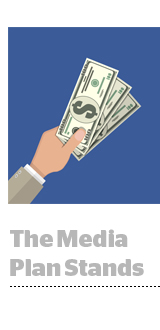
Facebook is running out of eyes to blacken in the wake of revelations over the weekend that Trump-affiliated data firm Cambridge Analytica harvested information from 50 million Facebook accounts without permission.
But as long as ads continue to perform on Facebook, the scandals won’t lead advertisers to pull back their spend.
“We may see individuals delete the app, but this won’t change spending patterns,” said Pivotal analyst Brian Wieser.
Advertisers follow the audience, said Melissa Parrish, VP and group director at Forrester, and as long as a channel “works,” they’ll continue to use it.
If advertisers were going to stop spending on Facebook because of bad news, there would have been a meaningful decline last year or even the year before with news of Facebook’s “fairly serious” measurement errors and its fake news problem, Parrish said.
“The only way this scandal affects Facebook advertising is if consumers grow weary and wary of Facebook and start to spend less time on the platform,” she said.
Indeed, Facebook did report a slight dip in North America daily active users during its last earnings call.
But Facebook is still far bigger than any other media platform in the world, other than Google.
“And if not Facebook, where is an advertiser going to go if they need digital media? Verizon?” Wieser said. “Well, that’s the No. 3 platform.”
And while Facebook may be getting a PR beating, advertisers won’t be guilty by association if they continue to advertise through the platform. Brands that advertise on Breitbart, for example, might cause consumers to blacklist a product. Those that advertise on Facebook are just among the more than 5 million brands that do.
Wieser likened the phenomenon to the many controversies that swirl around the NFL. Some viewers take offense at players who take a knee, while others don’t tune in because of the head injury issue. But, at least for now, advertisers aren’t pulling back on spend against the sport. They probably will, though, if viewership tanks.
Even so, the Cambridge Analytica episode is a major headache for Facebook, which has been putting out fires and popping proverbial Tylenol since mid-2016 with the first whisperings that Russian operatives had exploited its ad platform to help sway the US presidential election.
The most recent headlines are just more evidence of systemic problems at Facebook. The platform has been under increasing scrutiny from Washington on both sides of the aisle as it struggles to police its platform.
And Cambridge Analytica’s breach revolves around data that was permissibly collected by an academic researcher named Aleksandr Kogan, through an authorized app he’d created in 2015 – standard operating procedure at Facebook, although the type of data that could be collected through its API was far more expansive back then, including profile data on a user’s network of friends. This type of collection has since been barred by Facebook.
The leak happened when Kogan shared that data with Cambridge Analytica, which he had no right to do.
Although Facebook knew about it, it didn’t disclose the fact and didn’t make a robust enough effort to ensure that Cambridge Analytica deleted the wrongfully shared data. Cambridge Analytica says it deleted the data, but media reports and former Cambridge Analytica contractors say otherwise.
Facebook suspended the accounts of both Cambridge Analytica and its parent company, SCL Group, just hours before The New York Times and The Observer in the UK published expansive stories on Cambridge Analytica’s shady dealings with Kogan.
It’s a hot mess, but advertisers are far more likely to make media decisions “almost exclusively based upon their own individual tracking and performance” rather than on external factors, one media exec told AdExchanger, nothing that advertisers “would shift dollars only once a negative impact was measured and identified.”
That’s not to say advertisers and agencies aren’t getting more cautious. Another media executive told AdExchanger that internal guidance was issued to team members at the agency this weekend about being more proactive when vetting third parties that share or have access to data on Facebook.
But don’t expect advertisers to cross Facebook off their media plans.
“In my experience, Facebook has been incredibly respectful and diligent about customer data – in fact, sometimes it’s frustrating how little you can pull out of Facebook – and from what I’ve seen about this particular story, it seems to be more the fault of an irresponsible third party than Facebook itself,” said Adam Cahill, founder and CEO of programmatic agency Anagram. “Nothing that has happened would make me suggest to advertisers that they should change their point of view on Facebook.”
If advertisers want change, though, they should realize they actually have the power to make it happen without stopping to spend on Facebook, said Adam Heimlich, SVP of programmatic and managing director of HX at Horizon Media.
“Where are the voices echoing Unilever’s stance?” Heimlich said. “When all the top advertisers call Facebook into a meeting and say, ‘What the hell, guys, you knew about this since 2015 and you didn’t do anything?’ We need partners who care about this country’ – then you’ll see Facebook change.”
This post was syndicated from Ad Exchanger.

More Stories
The Tuesday Club hosts Women’s Work’s In(visible) exhibition in Tāmaki Makaurau
Under Armour Taps Estée Lauder Exec to Lead AI and Analytics
Lani Jamieson joins D3 to shape the next chapter of its growth